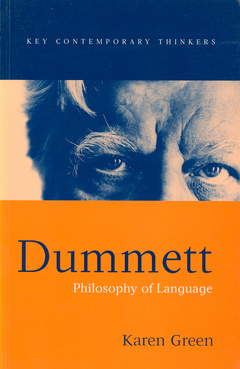Dummett Philosophy of Language Key Contemporary Thinkers Series
Auteur : Green Karen

Karen Green offers the first comprehensive introduction to Dummett's philosophy of language, providing an overview and summary of his most important arguments. She argues that Dummett should not be understood as a determined advocate of anti-realism, but that his greatest contribution to the philosophy of language is to have set out the strengths and weaknesses of the three most influential positions within contemporary theory of meaning - realism, as epitomised by Frege, the holism to be found in Wittgenstein, Quine and Davidson and the constructivism which can be extracted from Brouwer. It demonstrates that analytic philosophy as Dummett practices it, is by no means an outmoded approach to thinking about language, but that it is relevant both to cognitive science and to phenomenology.
Fregean Foundations.
Sense and Reference in Frege and Dummett.
Truth Assertion and the Central Argument Against Bivalence.
Frege's Platonism.
Frege's Kantian Connections.
The Context Principle.
Wittgenstein and Quine.
The Manifestability Constraint and Rejection of Mentalism.
Dummett and Quine.
Two Challenges: Holism and Strict Finitism.
The Manifestability Constraint and the Priority of Language.
How do Anti-Mentalism and Anti-Psychologism Stand to Each Other?.
The Influence of Intuitionism .
Brouwer's Intuitionism.
The Intuitionist Case Against Bivalence.
Metaphysical debates and the Theory of Meaning.
The Traditional case for Nominalism and Subjective Idealism.
Moderate Idealism and the Denial of Bivalence.
The Case Against Strict Finitism.
Pure versus Mediated Constructivism: Truth Theories and Semantics.
A Common-Sense Realist Appropriation of the Argument Against Bivalence.
The Reality of the Past.
Anti-Realism with Respect to the Past.
Anti-Realism with Respect to the Future.
What Do We Know When We Know A Language?.
Languages and Idiolects.
Davidson on Malapropism and the Social Character of Meaning.
Psychologism, Phenomenology and Philosophy of Mind.
On the Relationship of Phenomenology to Analytic Philosophy.
How Close are Frege and Husserl on Sense and Reference?.
Wittgenstein and Intentionality.
Conclusion.
Notes.
Bibliography
Date de parution : 10-2001
Ouvrage de 248 p.
15.2x22.9 cm
Thème de Dummett :
Mots-clés :
philosopher; dummett; stature; british; generation; language; rival; americans; questions; framework within; conjunction; responsible; influential; dummetts; prolific; accessible; rectify; book; situation; philosophy; first



